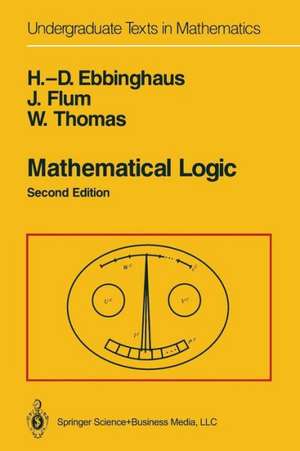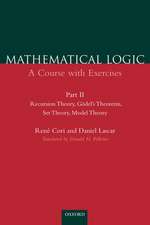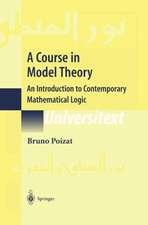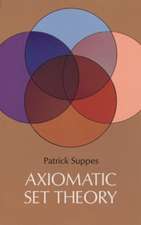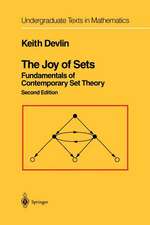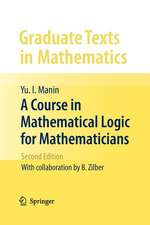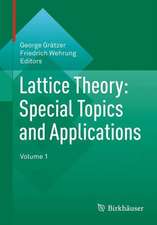Mathematical Logic: Undergraduate Texts in Mathematics
Autor H.-D. Ebbinghaus, J. Flum, Wolfgang Thomasen Limba Engleză Paperback – 11 dec 2012
| Toate formatele și edițiile | Preț | Express |
|---|---|---|
| Paperback (1) | 425.54 lei 38-44 zile | |
| Springer – 11 dec 2012 | 425.54 lei 38-44 zile | |
| Hardback (1) | 384.89 lei 3-5 săpt. | +25.70 lei 4-10 zile |
| Springer – 10 iun 1994 | 384.89 lei 3-5 săpt. | +25.70 lei 4-10 zile |
Din seria Undergraduate Texts in Mathematics
- 17%
 Preț: 362.13 lei
Preț: 362.13 lei - 17%
 Preț: 365.43 lei
Preț: 365.43 lei - 20%
 Preț: 466.84 lei
Preț: 466.84 lei - 17%
 Preț: 367.24 lei
Preț: 367.24 lei -
 Preț: 351.54 lei
Preț: 351.54 lei -
 Preț: 395.09 lei
Preț: 395.09 lei - 8%
 Preț: 384.89 lei
Preț: 384.89 lei -
 Preț: 306.96 lei
Preț: 306.96 lei -
 Preț: 380.27 lei
Preț: 380.27 lei -
 Preț: 400.43 lei
Preț: 400.43 lei -
 Preț: 358.11 lei
Preț: 358.11 lei -
 Preț: 372.27 lei
Preț: 372.27 lei -
 Preț: 400.43 lei
Preț: 400.43 lei -
 Preț: 364.41 lei
Preț: 364.41 lei - 17%
 Preț: 368.61 lei
Preț: 368.61 lei -
 Preț: 433.85 lei
Preț: 433.85 lei -
 Preț: 304.91 lei
Preț: 304.91 lei -
 Preț: 290.80 lei
Preț: 290.80 lei - 13%
 Preț: 389.61 lei
Preț: 389.61 lei - 17%
 Preț: 395.93 lei
Preț: 395.93 lei -
 Preț: 407.96 lei
Preț: 407.96 lei -
 Preț: 449.62 lei
Preț: 449.62 lei -
 Preț: 415.95 lei
Preț: 415.95 lei -
 Preț: 280.65 lei
Preț: 280.65 lei -
 Preț: 370.78 lei
Preț: 370.78 lei -
 Preț: 407.63 lei
Preț: 407.63 lei -
 Preț: 339.37 lei
Preț: 339.37 lei -
 Preț: 402.35 lei
Preț: 402.35 lei - 17%
 Preț: 373.60 lei
Preț: 373.60 lei -
 Preț: 398.78 lei
Preț: 398.78 lei -
 Preț: 440.01 lei
Preț: 440.01 lei -
 Preț: 424.14 lei
Preț: 424.14 lei - 17%
 Preț: 366.38 lei
Preț: 366.38 lei -
 Preț: 367.41 lei
Preț: 367.41 lei -
 Preț: 257.71 lei
Preț: 257.71 lei - 17%
 Preț: 362.67 lei
Preț: 362.67 lei - 15%
 Preț: 417.75 lei
Preț: 417.75 lei - 17%
 Preț: 366.40 lei
Preț: 366.40 lei - 19%
 Preț: 400.52 lei
Preț: 400.52 lei -
 Preț: 298.01 lei
Preț: 298.01 lei -
 Preț: 329.95 lei
Preț: 329.95 lei - 19%
 Preț: 492.83 lei
Preț: 492.83 lei -
 Preț: 396.24 lei
Preț: 396.24 lei -
 Preț: 390.08 lei
Preț: 390.08 lei
Preț: 425.54 lei
Nou
Puncte Express: 638
Preț estimativ în valută:
81.44€ • 88.43$ • 68.41£
81.44€ • 88.43$ • 68.41£
Carte tipărită la comandă
Livrare economică 18-24 aprilie
Preluare comenzi: 021 569.72.76
Specificații
ISBN-13: 9781475723571
ISBN-10: 1475723571
Pagini: 304
Dimensiuni: 155 x 235 x 20 mm
Greutate: 0.43 kg
Ediția:2nd ed. 1994. Softcover reprint of the original 2nd ed. 1994
Editura: Springer
Colecția Springer
Seria Undergraduate Texts in Mathematics
Locul publicării:New York, NY, United States
ISBN-10: 1475723571
Pagini: 304
Dimensiuni: 155 x 235 x 20 mm
Greutate: 0.43 kg
Ediția:2nd ed. 1994. Softcover reprint of the original 2nd ed. 1994
Editura: Springer
Colecția Springer
Seria Undergraduate Texts in Mathematics
Locul publicării:New York, NY, United States
Public țintă
Lower undergraduateDescriere
What
is
a
mathematical
proof?
How
can
proofs
be
justified?
Are
there
limitations
to
provability?
To
what
extent
can
machines
carry
out
mathe
matical
proofs?
Only
in
this
century
has
there
been
success
in
obtaining
substantial
and
satisfactory
answers.
The
present
book
contains
a
systematic
discussion
of
these
results.
The
investigations
are
centered
around
first-order
logic.
Our
first
goal
is
Godel's
completeness
theorem,
which
shows
that
the
con
sequence
relation
coincides
with
formal
provability:
By
means
of
a
calcu
lus
consisting
of
simple
formal
inference
rules,
one
can
obtain
all
conse
quences
of
a
given
axiom
system
(and
in
particular,
imitate
all
mathemat
ical
proofs).
A
short
digression
into
model
theory
will
help
us
to
analyze
the
expres
sive
power
of
the
first-order
language,
and
it
will
turn
out
that
there
are
certain
deficiencies.
For
example,
the
first-order
language
does
not
allow
the
formulation
of
an
adequate
axiom
system
for
arithmetic
or
analysis.
On
the
other
hand,
this
difficulty
can
be
overcome--even
in
the
framework
of
first-order
logic-by
developing
mathematics
in
set-theoretic
terms.
We
explain
the
prerequisites
from
set
theory
necessary
for
this
purpose
and
then
treat
the
subtle
relation
between
logic
and
set
theory
in
a
thorough
manner.
Cuprins
Preface;
Part
A:
1.
Introduction;
2.
Syntax
of
First-Order
Languages;
3.
Semantics
of
first-Order
Languages;
4.
A
Sequent
Calculus;
5.
The
Completeness
Theorem;
6.
The
Lowenheim-Skolem
and
the
Compactness
Theorem;
7.
The
Scope
of
First-Order
Logic;
8.
Syntactic
Interpretations
and
Normal
Forms;
Part
B:
9.
Extensions
of
First-Order
Logic;
10.
Limitations
of
the
Formal
Method;
11.
Free
Models
and
Logic
Programming;
12.
An
Algebraic
Characterization
of
Elementary
Equivalence;
13.
Lindstroem's
Theorems;
References;
Symbol
Index;
Subject
Index
Recenzii
“…the
book
remains
my
text
of
choice
for
this
type
of
material,
and
I
highly
recommend
it
to
anyone
teaching
a
first
logic
course
at
this
level.”
–
Journal
of
Symbolic
Logic
